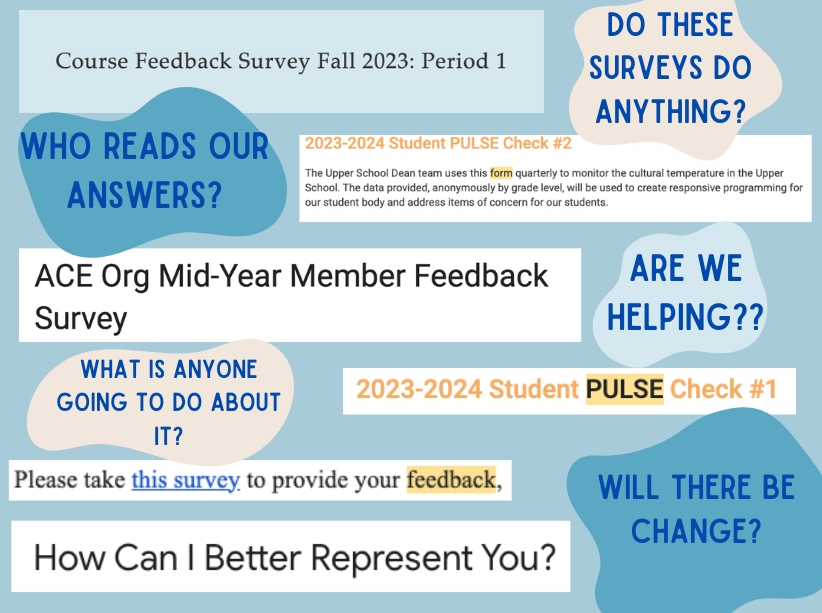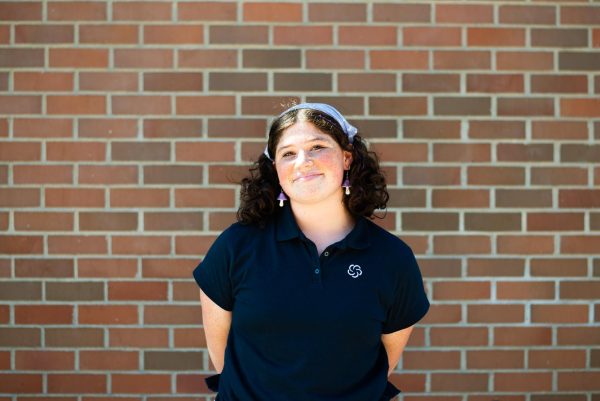Students feel that feedback surveys at Castilleja have room for improvement, and others feel that the school should look for new alternatives. Interviewees said that surveys are too frequent, leading to less student thought being put in each response.
Overall, students believe the current feedback process leads to less clarity around changes happening at Castilleja.
One example is the course feedback surveys taken by MS and US students last December.
Some students believe that this survey is the root cause of recent changes in the freshman and sophomore history curriculum. However, this is not the case.
“A change in history was announced before the surveys were done being analyzed,” Karen Strobel, Director of Institutional Research, said.
The actual purpose of the course feedback surveys is to provide feedback on how students feel about the core competencies at Casti – agility, initiative, and purpose. As a result of this, faculty members can make small adjustments to courses unrelated to curriculum.
“[The feedback surveys were] born of those competencies, where we can see the big picture of how our students are feeling in their capacities here,” said Christina Gwin, Faculty Dean and 7th Grade English teacher.
On a broader level, students feel that feedback communicated through surveys is not being addressed.
“I find that a lot of the changes that are happening in the classroom aren’t addressing those legitimate concerns,” Senior Class President Reece Sharp said. “They’re addressing more frivolous things, under the guise of ‘look, we’re responding to you guys because we’re making changes,’ but it’s not necessarily the changes I see that most students want.”
To make feedback more meaningful and prevent misunderstanding, Sophomore Class President Cali Scolnick suggested having “class representatives talk to someone in admin or talk to teachers on behalf of the grade, rather than [students] filling out a random survey.”
Miscommunication could also arise through a lack of detail in the surveys. “Let’s be real, no one puts detail into surveys,” Sharp said. “We try to get them done as soon as possible, which leads to my point that Castilleja students are being bombarded with surveys to the point where they are not really meaningful.”
During finals week last semester, sophomores hoped to provide feedback for the history curriculum. But they felt they were unable to communicate with their history teachers, and instead, some spoke directly with their dean.
Even so, Scolnick said that “part of [their] message got a little misinterpreted.”
Some students in the class of 2026 felt that because of the standards-based grading system, the majority of work completed in the first semester barely counted towards their end-of-semester grades. While the class had hoped for more opportunities to demonstrate a standard, instead, the grading system was changed altogether to have every assignment count for a grade.
Communicating directly with administration through student representatives could eliminate misunderstanding around feedback. If administrators had questions, students would also be able to clarify.
“I know a lot of people want to keep [the surveys] anonymous, but what if teachers had questions about the feedback or how they can implement it?” Freshman Class President Adya Chowdhury said. “If there are some students who are brave enough, they should be able to talk to the teacher to help them or tell them what they want. Otherwise, it might be a little confusing.”
Ella Kemp, Junior Class President, said that “[Administrators] could make [the feedback process] more of a step-by-step process, like when they are implementing the changes.” Kemp suggested that additional forms can be sent out to include more student voices.
In fact, a recent survey on SBTL was sent out to 9th and 10th-grade students in light of comments on the course feedback survey about grading systems. “We designed a special survey around that to help inform that shift and what will happen with how standards-based grading will move forward based on student feedback,” Strobel said.
Still, despite some administrators listening and making room for the student voice, students said they feel there is room for improvement in the feedback process.
“I’ve met with plenty of administrators. When I talk to them, they hear my issues, and they treat me like someone with respect and a valuable perspective,” Sharp said. “But I think overall we can improve on this process, and we definitely can improve by putting more respect on the words of students.”




